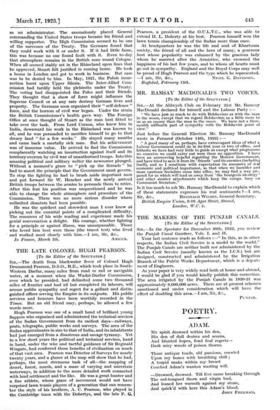THE LATE COLONEL HUGH PEARSON.
[To the Editor of the SPECrATOR.] Sis,—The death from blackwater fever of Colonel Hugh Drummond Pearson, D.S.O., R.E., which took place in South- Western Darfur, many miles from road or rail or navigable water, at a moment when the Wadai-Darfur Commission, over which he presided, had delimited some two thousand miles of frontier and had 'all but completed its labours, will arouse public sympathy and regret for a gallant and distin- guished officer serving the Empire in its outposts. His public services and honours have been worthily recorded in the Times. But an old friend may, perhaps, be allowed a few words more.
Hugh Pearson was one of a small band of brilliant young Sappers who organized and administered the technical services of the Sudan Government from its earliest days—railways, posts, telegraphs, public works and surveys. The area of the Sudan approximates in size to that of India, and its inhabitants had just emerged from a disastrous and savage tyranny. Yet in a few short years the political and technical services, hand in hand, under the wise and tactful guidance of Sir Reginald Wingate, had conferred those benefits of civilization on much of that vast area. Pearson was Director of Surveys for nearly twenty years, and a glance at the map will show that he had, perhaps, the most strenuous task of all—the mapping of desert, forest, marsh, and a maze of varying and uncertain waterways, in addition to the more detailed work connected with land settlement and the like. He was a great hunter and a fine athlete, whose grace of movement would not have tUrprised lawn tennis players of a generation that can remem- ber the style of his brothers, A. C. Pearson, who played in the Cambridge team with the Dohertys, and the late P. Q.
Pearson, a president of the O.U.L.T.C., who was able to extend H. L. Doherty at his best. Pearson himself won the lawn tennis championship of the Sudan more than once.
At headquarters he was the life and soul of Khartoum society, the friend of all and the hero of many, a generous host whose popularity was enhanced by the gracious lady whom he married after the Armistice, who crowned the happiness of his last few years, and to whom all hearts must go out in sympathy. England and the Royal Corps may well be proud of Hugh Pearson and the type which he represented.










































 Previous page
Previous page